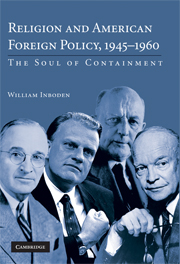Preface and Acknowledgments
Published online by Cambridge University Press: 31 July 2009
Summary
In recent years, when friends and acquaintances would inquire about the topic of my book, their responses almost invariably included some version of “well, that is certainly quite relevant these days.” I think they are right. As a factor in international relations, religion has acquired – or perhaps re-acquired – a new salience that before had been neglected in the years preceding “the eleventh of the ninth,” 2001. Whether as the declared motivation for those who attacked the United States on that day, or in the personal convictions and public statements of recent British Prime Minister Tony Blair, or likewise in the worldview of the American President whom I worked under at the National Security Council, George W. Bush, religion cannot be ignored.
Yet historians sometimes risk tripping into anachronism or even inanity when trying to make political judgments on the present day from their study of the past. In some cases that can well be an appropriate and helpful exercise, one in which I at times participate myself. But it is also a path fraught with methodological peril. Excavating the origins of the Cold War is a sufficient challenge in its own right. To speculate here on what the early Cold War's religious dimension means for current events would, I believe, do justice neither to the past nor the present.
- Type
- Chapter
- Information
- Religion and American Foreign Policy, 1945–1960The Soul of Containment, pp. ix - xiiPublisher: Cambridge University PressPrint publication year: 2008



